The article about Pediatric Associates in CA has a nugget with a potentially outsized impact: the implication that VFC vaccines…
News 7/17/14
Top News
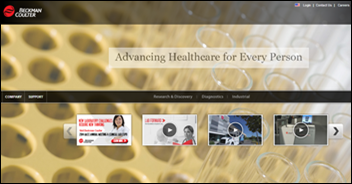
Beckman Coulter Diagnostics announces its intent to purchase the clinical microbiology business of Siemens Healthcare Diagnostics. The move lends credence to recent speculation that Siemens is set on divesting parts of its business – including healthcare IT – so that it can focus on its industrial and energy segments. The transaction is expected to close in the first quarter of 2015.
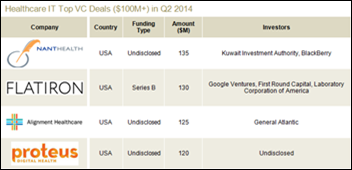
Mercom Capital Group reports that the healthcare IT sector saw its first billion-dollar quarter, with 161 deals raising $1.8 billion in venture capital during the second quarter of 2014. Ten of those deals were for over $50 million each. Over $2.5 billion has been raised so far this year, with mobile health companies leading the funding pack. Practice-centric companies took in 61 percent of all VC investments in Q2 2014, with $1.1B in 61 deals. The quarter also saw a record number of M&A transactions, with HIM companies seeing the most activity, followed by revenue cycle management, mobile health, and personal health. I wonder how these figures will play out in the near term, as the EHR market slows down and consumer-centric health devices continue to take off.
HIStalk Practice Announcements and Requests
Mr. H is offering the HIStalk BOSS (Beacon of Selfless Service) Award to recognize, as he puts it, “those trench warriors (provider or vendor) who toil without bonuses, reserved parking spaces, or the ever-present validation of company-paid butt kissers.” He’s specifically looking to heap praise on a non-management employee who went above and beyond during a specific event to save the day. Anyone who observed the individual’s laudable effort firsthand can nominate someone – a supervisor, peer, or customer. I’m sure I can convince him to throw in a “BOSS Award Winner” beauty queen sash that the honoree can wear to HIStalkapalooza 15. Submit your candidate here.
We like to keep in touch with HIStalk Practice’s sponsors and we just sent an e-mail to all the contacts on our list. Let Lorre know if we missed you.

I’m still on my quest to try new things with HIStalk Practice, and so I’m introducing the “Idea of the Day” to give physicians and consultants an opportunity to share tips and tricks of the trade with our audience. Do you have a healthcare IT-related piece of advice or tip you’d like to share? Be sure to highlight how it has made life easier at your practice, or your client’s practice. Submit your ideas via the “Idea of the Day” link above. You can choose to remain anonymous if you’d like.
Acquisitions, Business, Funding, and Stock
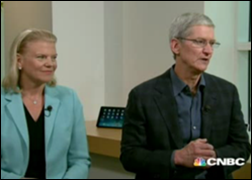
IBM and Apple announce a partnership to develop business applications for iPhones and iPads. IBM will also sell Apple products and provide on-site services to business clients, while Apple gains business credibility and a tie-in to IBM’s big data capabilities that will make its devices decision-making tools. The deal also gives Apple’s iOS more enterprise credibility against the more widely used Android operating system. The companies say more than 100 business apps will be available by fall.

The US Bankruptcy Court approves MModal’s reorganization plan, allowing the company to emerge from bankruptcy in August as it had originally announced.


EHNAC and WEDI launch an accreditation program for practice-management systems, announcing GE Healthcare, Medinformatix, and NextGen as pilot participants.
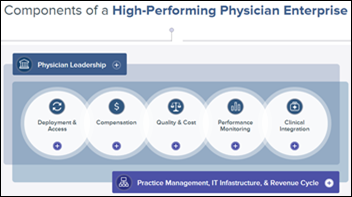
ECG Management Consultants announces a new service line designed to help physician groups and ambulatory care networks improve performance and transition to a value-based environment. Services include performance assessments, improvement planning, and implementation and optimization services.
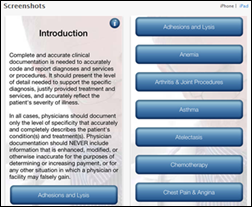
Elsevier Clinical Solutions announces its Clinical Documentation Improvement Reference App, which provides clinical term look-up and medical necessity information with an emphasis on ICD-10.
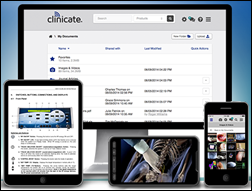
Clinicate launches its clinical file-sharing solution for providers and patients. It also contains some unrelated tools such as drug lookup. It’s free for patients and a single provider can use the system for free for up to 100MB of storage.
Healthcare Data Solutions announces availability of the HealthcareData360 EHR market intelligence database, which allows looking up EHR decision-makers within and across connected provider organizations.
Announcements and Implementations

Optimus Healthcare Partners (NJ) announces it will partner with UnitedHealthcare to care for 17,000 patients enrolled in the payer’s employer-sponsored and Medicare health plans. OHP, an ACO with over 550 physicians, already serves patients within the Aetna and Horizon Blue Cross Blue Shield of New Jersey networks. The agreement with UnitedHealthcare means nearly all of OHP’s patients are now part of the ACO.

CVS Caremark enters into clinical affiliations with ProHealth Physicians (CT), Texas Health Resources, Palmetto Health (SC), and The Baton Rouge Clinic (LA). Patients will receive access to chronic-disease monitoring, wellness, medication counseling, and clinical support programs at CVS/pharmacy stores and MinuteClinic facilities. The company will also provide prescription and visit information through integration of their EHR. CVS is in the process of switching its 800 MinuteClinics from a home-grown EHR to EpicCare. Two of the four organizations above seem to be Epic shops, so I’d love to learn how CVS plans to share data with those that aren’t.
CVS Caremark also announces, in partnership with IBM, a $1.5 million commitment to the “Technology Solutions for Smarter Health” grant program. Qualifying community health centers will use the funds for the support of technology to increase patient engagement, and improve patient care and outcomes.
Government and Politics
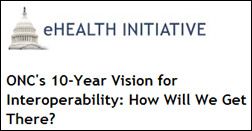
I listened in on the recent eHealth Initiative webinar on ONC’s 10-year vision for interoperability, which focused on the five building blocks laid out in the similarly titled ONC paper released a few weeks ago. Erica Galvez, ONC’s interoperability portfolio manager, did a good job of outlining the five fundamental concepts, but I wish she’d gotten stronger pushback from commentators Mark Segal, VP of government affairs at GE Healthcare IT, and Doug Dietzman, executive director of Great Lakes Health Connect. (Both men are affiliated with eHI.) All three speakers placed great emphasis on the fact that true interoperability will occur only if industry is allowed to take the lead in terms of product innovation. Segal and Dietzman were particularly focused on the need for future certifications and standards to not become too burdensome, inadvertently hindering product development and interoperability goals. Are current standards and certifications impeding the creative/innovative use of healthcare IT at your practice, or the development of your proposed product? Share your thoughts via the comments section below. You can download slides from the presentation here.

A report from the OIG highlights flaws in the Medicaid Interstate Match program, which is intended to reduce Medicaid payments by identifying beneficiaries enrolled in the Medicaid programs of one or more states. The report found that for the three-month period under examination, not one improper Medicaid payment was recovered through the use of the program. This inability to recover improper payments was not attributed to attempts at fraud, but less scandalous issues such as eligibility errors and incomplete data. While the government does a good job of saber rattling about the amount of fraudulent healthcare payments, this report may force some perspective on the matter from CMS, which is responsible for acting on its recommendations.
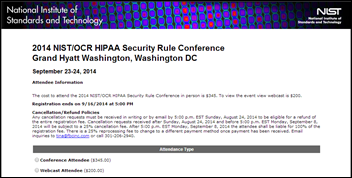
NIST and OCR will co-host “Safeguarding Health Information: Building Assurance through HIPAA Security” on Sept. 23-24, 2014 at the Grand Hyatt in Washington, D.C. Onsite attendance runs $345, while Webcast attendees will pay $200.
Research and Innovation
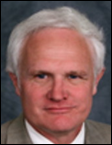
The Stepped Care to Optimize Pain care Effectiveness (SCOPE) study finds that chronic-pain patients enrolled in a year-long telemedicine program using non-opiod medications were twice as likely to see improvement as those who received typical care for chronic pain. SCOPE automated symptom monitoring was delivered to 250 patients at the Richard L. Roudebush VA Medical Center (IN) via the Internet or interactive, voice-recorded phone calls.
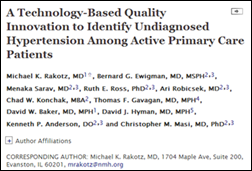
Researchers query the EHRs of 23 primary care practices to identify patients likely to have undiagnosed hypertension based on their historical pattern of in-office blood pressure readings, inviting those patients to follow up with a more comprehensive series of readings. The practices alerted patients and then turned their work into a quality improvement project, continuing to remind patients and physicians of the need for follow-up until an ICD-9 code was entered indicating that hypertension had been confirmed or ruled out.
People


Jonathan Samples leaves Greenway Health to co-found Across Healthcare with former Greenway colleague Jason Colquitt, who is also head of IT Real-World & Late Phase Research at Quintiles. AH, which seems to have been in the works since 2012, focuses on custom software development; and digital health strategy, consulting, and products.

Perry Lewis (McKesson) is named VP of industry relations of CoverMyMeds.

Ralph Whitworth resigns as chairman of Hewlett-Packard’s board in order to focus on his health.

Babak Parviz leaves the Google X research team (responsible for such projects as Google Glass and smart contact lenses) for Amazon. Industry insiders speculate he’ll use his background in optic technology to help with Amazon’s recent focus on 3-D visuals and augmented reality.

Jessie Gruman, president and founder of the Center for Advancing Health, passes away after a fifth battle with cancer.
Other

This article posits that passwords will soon be things of the past as email addresses, social logins, and physical authentication take over. Apple has already introduced biometric identification to the iPhone, and Google has presented an Android phone that can unlock itself if it detects the presence of a paired Android bluetooth device belonging to the same owner, such as a smartwatch. I’m not sure that’s the best answer. While passwords are often forgotten, they can just as easily be recreated. It might be a bit more difficult to replace that lost smartwatch.

Dwayne Edwards, director of the West Virginia Regional Health Information Technology Center, writes that healthcare practices, not EHR vendors, are responsible for HIPAA compliance; Meaningful Use requirements; and protecting the confidentiality, integrity, and availability of health data in the EHR. He offers the following tips:
- Conduct a security risk analysis that compares your current security measures to what is legally and pragmatically required to safeguard patient health information.
- Develop an action plan for addressing threats and vulnerabilities.
- Manage and mitigate risks by beginning to implement a thorough P&S action plan.
- Conduct workforce education and training.
- Communicate with patients.
- Know what to do in case of a breach of unsecured patient health information.
Contacts
Mr. H, Lorre, Jennifer, Dr. Jayne, Dr. Gregg, Lt. Dan, Dr. Travis
More news: HIStalk, HIStalk Connect.
Get HIStalk Practice updates.
Contact us online.

